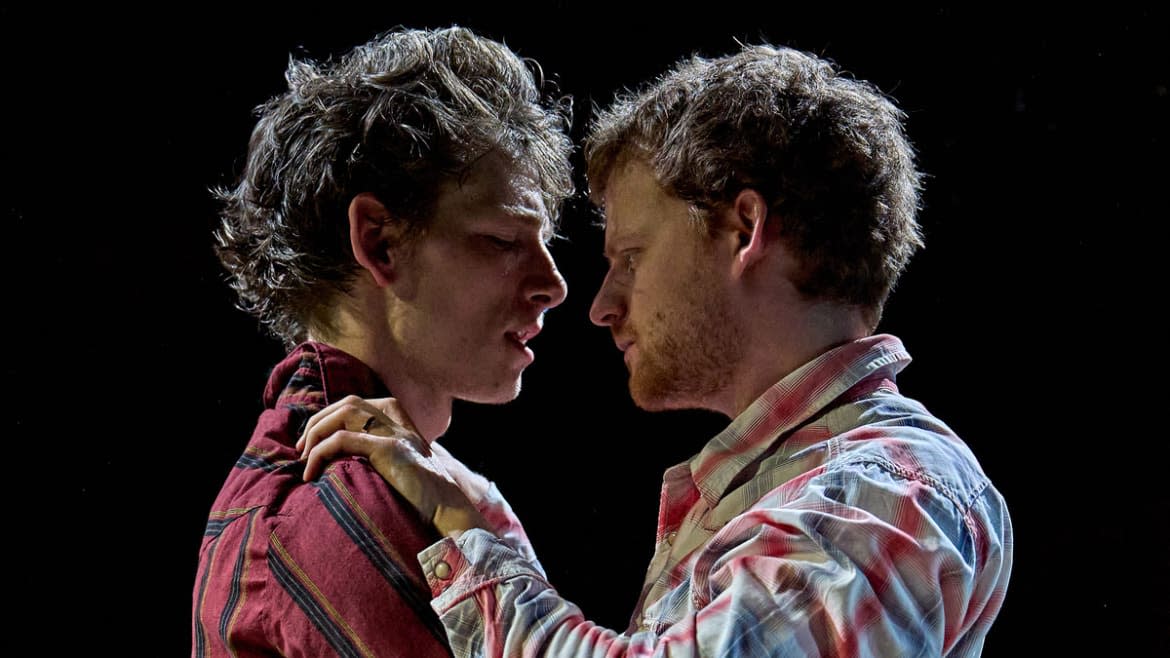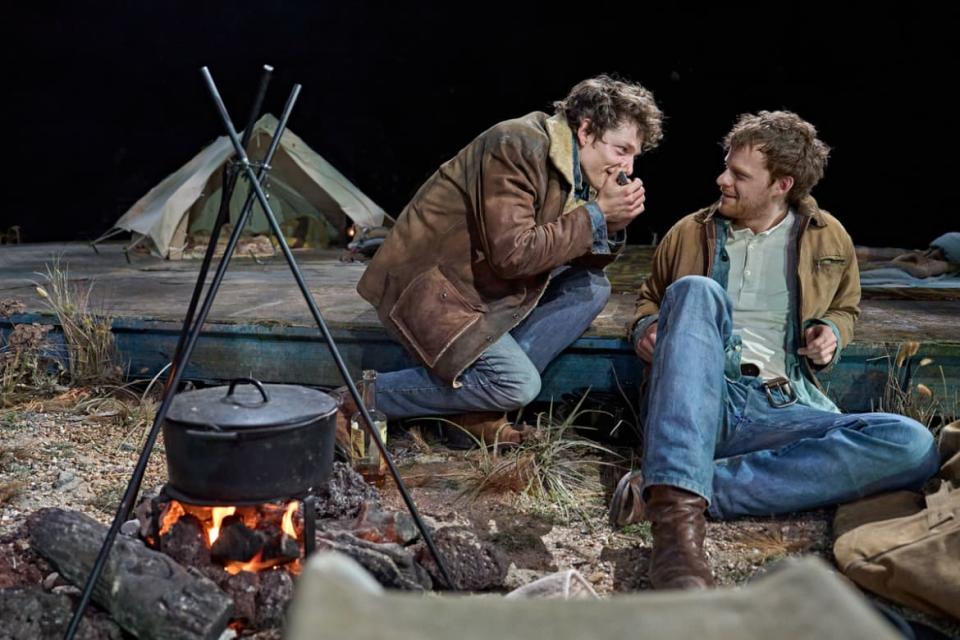‘Brokeback Mountain,’ the Play, Is Missing the Movie’s Magic

Annie Proulx’s stunning short story about two Wyoming cowboys falling for each other in unforgiving circumstances captured the hearts of many in 1997, and even more so when Ang Lee directed an acclaimed film adaptation in 2004. Following its 2018 adaptation into an opera, writer Ashley Robinson has penned a theatrical adaptation of Brokeback Mountain, which had its world premiere in London’s West End this month (Soho Place, booking to Aug 12).
It’s a well-known story at this point, and the play seeks to inject new life into the timeless tale under director Jonathan Butterell (Everybody’s Talking About Jamie). The play comes with considerable pedigree, with rising stars Mike Faist (West Side Story) and Lucas Hedges (Manchester by the Sea) making their UK theatre debuts, playing Jack Twist and Ennis Del Mar, respectively.
How Landmark LGBT Movie ‘Brokeback Mountain’ Became an Opera
Brokeback Mountain opens with an older version of Ennis (Paul Hickey), lying mournfully on the bed. It’s not long before we meet the younger Ennis (Lucas Hedges) and Jack (Mike Faist), but the Older Ennis just… stays there.
In theory, having Older Ennis look back on his past is touching, and Hickey gives a thoughtful, tender, performance. But the reality of having Older Ennis linger around the small, intimate stage for the entire 90 minutes of Brokeback Mountain is another thing entirely.
It all feels out of place: opening the play with Older Ennis is an effective framing device, and we don’t learn anything else from him sticking around. At times, it’s emotionally resonant, but at others, it feels almost as if an audience member got stranded on stage. Framing things entirely through the Old Ennis’ perspective also means we never get to see Jack’s life outside of Ennis—a shame, since it would have been fascinating to see how Jack got on in life without his love.
The trouble is that it distracts far too often from the beating pulse of the show: Ennis and Jack. The decision is especially beguiling as the stage is minimal, and the in-the-round style of Soho Place only seeks to amplify the distraction. It’s an ideal setting for a quiet, understated show like this one, though there’s not a lot of negative space here—the set is cleverly constructed, and any extra bodies stick out awkwardly.
Another element that Brokeback Mountain struggles to make sense of is the inclusion of music. The show is billed as “a play with music,” and it’s performed admirably by a band, with vocals sung with a soulful country twist by Eddi Reader. But the music, like Older Ennis’ lingering presence, never adds anything to the emotional turmoil felt by our beloved cowboys.
The songs aren’t particularly memorable either, and they too often veer into telling us what we already know, attempting to explore the interiority of Jack and Ennis. The script, written by Ashley Robinson, is emotionally potent yet the dialogue is sparse. It’s refreshingly matter-of-fact, and there’s never any doubt as to what Jack and Ennis are thinking. Therefore, the frequent musical interjections feel superfluous.

Mike Faist and Lucas Hedges in Brokeback Mountain.
The power of Brokeback Mountain lies within the performances of Hedges and Faist. For the first third, their desire is communicated through longing glances and languid pauses. There’s excitement in the air when the pair are together, and their chemistry is scintillating. They capture that boyish first love with ease, channeling an adolescent yearning into their characters.
When they finally get their hands on each other, it’s difficult for them to keep their hands off each other. That’s a big problem in 1960s Wyoming, and you can feel the anguish of consigning themselves to a life in secrecy radiating off their bodies.
The supporting cast does fantastic work elevating paper-thin characters. Emily Fairn is particularly touching as Ennis’ wife Alma, but the play doesn’t afford us much of a glance into Alma’s life.
As Ennis, Hedges is quiet and contemplative. He’s a man who prefers silence over speech, and the actor plays the role admirably, only getting more exciting to watch as the play unfolds. But this show belongs to Mike Faist, whose Jack is ebullient and thrilling. The play feels designed to put the weight on Faist, who’s more than up for the challenge. He handles some (deliberately) corny dialogue with aplomb and delivers the all-powerful “I wish I knew how to quit you” masterfully. It’s the kind of performance you show up for.

Eddi Reader in Brokeback Mountain.
At just 90 minutes, Brokeback Mountain feels rushed, with every song propelling things faster ahead than they need to be. One of the things that make Ang Lee’s film work so brilliantly is the stretches of silence that let us really live in what these characters were feeling. There are a few moments like this, and they’re powerful, but there aren’t nearly enough. With music filling nearly every void, it’s challenging to engage as much as you’d like. It would have been particularly compelling to see how they act in public with one another. Thankfully, brilliant performances shine through the rushed pacing, but more time to really let Hedges and Faist explore these wonderful characters wouldn’t go amiss.
The story of forbidden gay love feels as timely as ever, and when Jack and Ennis talk about how impossible it would be to actually live together in society feels tragically relevant today. In the face of deeply concerning legislation coming from every corner of the world and extreme rises in hate online, a play like Brokeback Mountain couldn’t have come at a better time, highlighting the gorgeous humanity of queer lives. It’s a universal story, and the play’s ending brings things together brilliantly, combining every disparate element together to a smart, effective degree. If only the show trusted in the amazing talent at hand, giving them every possible moment to shine.
Get the Daily Beast's biggest scoops and scandals delivered right to your inbox. Sign up now.
Stay informed and gain unlimited access to the Daily Beast's unmatched reporting. Subscribe now.

 Yahoo News
Yahoo News 
